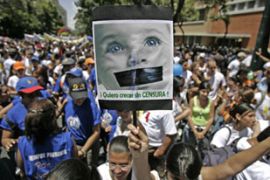Venezuelan channel taken off air
Government says station critical of president is not complying with regulations.

Chavez in 2007 denied RCTV a renewal of its broadcast license, accusing the station of participating in a 2002 coup against him.
During that coup, networks showed footage of anti-Chavez protests leading up to his brief ouster, but turned cameras off when he was restored to power.
Free speech ‘silenced’
Media freedom groups and the US government, which have previously accused Chavez of seeking to limit free speech, condemned the decision to take RCTV off free-access TV.
 |
| During a 2002 coup, RCTV broadcast non-stop footage of anti-Chavez protests [AFP] |
Miguel Angel Rodriguez, the channel’s most popular talk show host, said: “They want to silence RCTV’s voice.
“But they won’t be able to because RCTV is embedded in the hearts of all Venezuelans.”
Robin Holzhauer, a US embassy spokesperson, said: “Access to information is a cornerstone of democracy and provides a foundation for global progress.
“By restricting yet again the Venezuelan people’s access to RCTV broadcasts, the Venezuelan government continues to erode this cornerstone.”
Dima Khatib, Al Jazeera’s correspondent in Caracas, said: “About 16 organisations issued a statement accusing the government of using camouflage methods to silence them.”
“[But] I haven’t found any real protests on the streets today, other than those of the staff members of the channel.”
Broadcast restrictions
RCTV started a cable-based “international” station based in Miami to avoid content restrictions after having its license revoked.
But the government said the station was still subject to broadcast restrictions because most of its content was produced in Venezuela.
RCTV said in a statement earlier this week: “[The measure] is meant to silence the voice of protest of the Venezuelan people in the face of the failure of the government’s administration.”
Chavez faces growing criticism over shortages of power and water and a sharp currency devaluation this month that could accelerate the country’s soaring inflation.
He has boosted pro-government broadcasting in recent years by creating several state-funded television networks including the Telesur channel, meant to be a Latin American leftist counterpart to CNN.